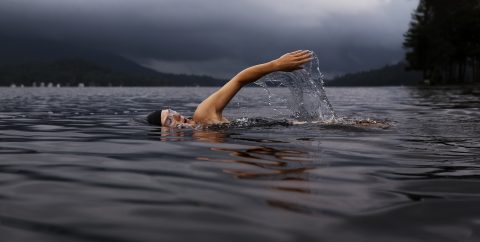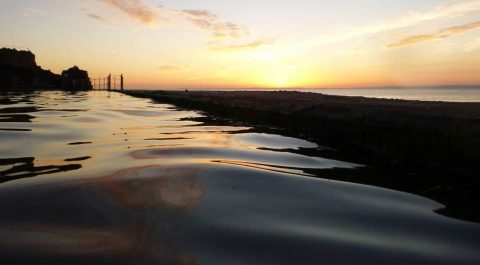Outdoor Swim Therapy ~ Clevedon
On October 10th 2017 I set up a fun and informal weekly swim meetup at Clevedon Marine Lake.
Further down this page you'll find information on the benefits of outdoor swimming and some tips on what to bring if you've not been before. Please note you swim at your own risk.
Who?
This is an informal friendly group and anyone is welcome. If you feel you need a bit of a boost this winter it could be just what you need.
Why?
- Fun! A social open water swim, plus motivation and moral support, to continue with open water swimming through the colder months
- To encourage anyone who wants to try outdoor swimming to help overcome depression/ anxiety and increase confidence/ self esteem
- To help you discover the benefits of Open Water Swimming, if you haven’t already
Where?
Marine Lake, Clevedon (Salthouse Pub end, by the steps)
When?
Please get in touch for more details


The benefits of Outdoor Swimming
As you may be aware there is a lot of research on the many benefits of outdoor swimming, especially through the winter. There's a lot more information on this further down this page.
Maybe you suffer from depression, low mood, SAD (Seasonal Affective Disorder) or anxiety?
Maybe you just want to feel better about yourself and feel more confident?
My aim is to motivate people to discover what the benefits of Outdoor Swimming are for them.
Safety first- everyone swims at their own risk
Please note you must be confident swimming out of your depth. Also our meetups do not have anyone on standby, such as lifeguards, or anyone who is first aid trained. Be aware of what you are capable of and use common sense whilst having fun!
Outdoor swimming and cold water swimming can be dangerous if you are unprepared. Read the below tips for winter swimming.
Hopefully see you soon!
Tips for Winter Swimming
Here are a few tips which helped me start and continue winter swimming. You just have to find out what works for you.
What to take
- Lots of warm clothes that are easy to get on; layers are ideal, just make sure your finishing layer is big enough to accommodate any under layers
- Thermal leggings, vests and thick socks if you have them
- 1-3 hats; I wear a swim hat and a woolly hat whilst swimming in the winter and take another one to change into after! A thick swim hat is ideal to keep you warm, neoprene is apparently the warmest
- Something to stand/ sit on when getting changed; I use a thermally insulated folding sit mat which you can buy via Amazon, or you can just use towels
- Goggles- even if you don’t intend to put your face in the water goggles are great if it’s choppy
- Consider buying ear plugs to avoid Surfer’s Ear or any ear infections, such as Swimmer’s Ear/ Otitis, which can be really painful
- You may also want to buy neoprene gloves, booties and wetsuits if you don’t have them already; wetsuits can help with buoyancy
- A changing robe or towel
- A flask; it’s good to have something with honey or sugar in it if you are not having cake or something to eat after- chamomile tea with honey is my favourite; water with maple syrup has been suggested too
- Cake or something sweet to eat?!
Before
- If you are pregnant, have an underlying cardiac condition, high blood pressure, asthma, diabetes or epilepsy, talk to your GP or treating consultant
- Be aware of temperature drops between swims and shorten your swim accordingly; start with a maximum of 1 minute in the water per degree
- Try cold showers every day over a week, apparently this can help you acclimatise, just 2 minutes is enough!
During
- Have fun! But just make sure you know what you are capable of
- Always swim with someone or ensure you have someone watching out for you on the side
- Wear at least one hat
- When getting in some people find it useful to acclimatize first by walking in up to their knees and/ or splashing their face, back of the neck, wrists and face; this will prime your body for entry as these are sensitive parts of the body
- Remember to breathe and try to slow your breathing down by breathing in through your nose and out through your mouth; try to make the out breath longer than the in breath
- As you go into the water the rib cage contracts, at this point breathing out slowly can really help
- Try to focus on something positive as you enter the water, e.g. repeat something to yourself such as ‘I can do this’, ‘I am warm’?!
- Think of something warm, e.g. snuggling up to a hot water bottle when you get home and a hot drink, or being on a beach on a really hot day
- Remind yourself that the first couple of minutes are the worst after which it WILL get better
- ‘Begin with the end in mind’ and imagine the buzz you will feel when you get out
- It can be good to set yourself a goal; maybe start by just dipping then move on to a short distance. In the winter, I aim to go around the pontoon rather than do lengths; the distance from the steps by the rocks, around the pontoon and back is approximately 100 meters
- Find something to focus on when swimming and count anything, e.g. each breath out, each time you do a stroke or you could repeat the number of the length or circuit you are doing (1, 1, 1 for the first, then 2, 2, 2 etc
After
- When you get out you have around 5 minutes before the after drop (the drop in core body temperature resulting from the return of very cold blood from the extremities to the core)
- Changing robes can help speed up the process- getting your swim stuff off as quickly as possible, getting your core warm and socks and hats on are the most important first steps
- Once you’re dressed have a hot drink
- Some people have experienced severe after drop from having a bath or shower too soon after swimming causing them to faint or fall over
- Be careful about driving too soon; this can be dangerous if you’re suffering from after drop
Other notes
- Small regular dips can help you acclimatise so that it becomes easier
- People recommend going at least once per week throughout the winter but if you can’t do this it’s worth giving it a try whenever you can and seeing how you get on; some people acclimatize more easily than others
- ENJOY every minute, it’s so revitalising and has huge health benefits
Make sure you have no regrets!
Dervla Murphy, a veteran travel writer, said that she never regretted going for a swim but often regretted not doing so. I completely relate to this and the following may help you understand why!

My open water swimming story
I’ve been open water swimming without a wetsuit since October 2016. Initially I made a commitment to going at least once a week to try to build up to the cold winter temperatures.
When I first started I couldn’t believe how lucky I was to be able to go to the Marine Lake in Clevedon and swim whenever I wanted. I’d thought about it for a good while but wasn’t sure. Then I met someone who was going in twice a week, joined the Clevedon Lake and Sea Swimmers Facebook group, watched the Dr Who Gave Up Drugs and read about all the benefits of cold water swimming. I became so inspired I just had to do it.
Having completed my first winter of open water swimming I can honestly say I have loved every minute of it! Overall, it’s been such a great challenge it’s really made me realise that we are all capable of much more than we think.
I’ve definitely been healthier with just one mild cold over the winter, whilst the rest of my family have had the usual multiple colds, which I was equally vulnerable to last year. I have felt more energised, resilient and stress free during the more challenging days of dealing with kids and other stressors during the dark winter days.
It has been highly addictive, especially during the winter, to the point that I even swam when it was below freezing out and 3 degrees in the water. The social side and moral support is definitely paramount on such days though! Luckily you get to meet like minded people, which has had a massively positive effect.
The surge of adrenalin and endorphin boost during and after swimming is like no other. My instinctive drive to experience this means I feel no fear of stepping into the water.
It doesn’t matter what the temperature is. It’s just something I’m going to do and whilst doing it I know I’ll be in such a mindful state because there’s no room for anything else in my head. It’s so peaceful. It’s like active meditation, especially due to the rhythm of swimming.
It’s just me and the water and unwanted thoughts are gone the instant I enter it. It puts things completely in perspective and puts a smile on my face and of course simple smiling has it’s own benefits. Afterwards I experience such a euphoric, hugely feel good, state. I feel alert and energised for the rest of the day.
I have had days when I’ve felt I had a cold coming on and have gone for a swim and the symptoms just disappeared. I have had aches and pains that go away after swimming too.
I used to go cycling, walking, swim at the local pool and do yoga at home. I thought I was someone who didn’t like the cold and didn’t like to get her hair wet but none of that matters when I’m open water swimming- it just feels so much better than any other exercise!
If swimming as a form of exercise is good...
Just think of all the benefits of swimming and then add the benefits of open water swimming (to follow)... it's no wonder it feels so good. According to the Amateur Swimming Association there are 8 great reasons you should try swimming:
- Full body workout
- Great for general wellbeing
- De-stresses and relaxes
- Burns calories
- Lowers risk of diseases
- Supports the body
- Increases energy levels
- Exercise without the sweat
Outdoor swimming as 'therapy'
MARLENS is the charity that does a wonderful job of running and maintaining Clevedon Marine Lake. Their website includes some ‘Lake History’:
“The Marine Lake dates from 1929 but the history of sea bathing in Clevedon dates from the early years of the 19th Century when it was very much used as a form of therapy rather than enjoyment.”
Apart from sea bathing having historical roots it’s therapeutic benefits are recognised in many parts of the world.
“Although it is one of those areas that is yet to be proven conclusively, it is a common belief in many cultures of the world that there are indeed therapeutic effects of immersion in cold water.
Indeed, we all know the effect of jumping into a cold pool or the sea on the first swim of the summer - it's bracing right? You certainly don't come out feeling lethargic and depressed. Researchers put this down to cold water acting like a mild stressor, activating the immune system and giving it a workout.”
Cold water swimming and depression
September 14, 2018 “A case study published in British Medical Journal Case Reports suggests open water swimming might help people with depression be able to give up their medication and live happier lives… The study is the first to examine open water therapy to treat depression….” There is more about this below and the 'Dr who gave up drugs'.

The benefits of outdoor swimming
Research plus plenty of anecdotal evidence suggests that outdoor swimming can have many benefits. The following are just some:
1. Endorphins, adrenalin and natural pain relief
Cold water swimming has certainly given me a natural high and become truly addictive. It sets me up for the day by giving an overall sense of wellbeing- one of calm and euphoria. This can be explained by the endorphins that are generated to help deal with the sting caused by the cold water. Endorphins are the bodies natural pain killers.
‘People say they feel great after a sea or river swim, which may be because the chilly water activates cold sensors all over our bodies — cells positioned just 0.18 millimetres under our skin — which in turn increase heart rate and give us that “alive” feeling,’ explains Michael Tipton, Professor of Human and Applied Physiology at Portsmouth University.
‘The cold sensors also trigger a sudden burst of adrenaline that diverts our attention away from our aches and pains, creating the feel-good factor. It’s effectively a natural painkiller.’ (1)
One woman who swims five or six times a week even claims it helps her with a condition she has called Ehlers Danlos Syndrome (an inherited tissue disorder). “I am able to cope without any pain relief on the days I swim. Before winter swimming I was on morphine every day. It has literally changed my life,” she says (2).
2. Reduced depression and anxiety
The parasympathetic system is responsible for rest and repair and can be activated by the cold. This can stimulate the release of dopamine and serotonin- the neurotransmitters that help make you happy 😊 Low levels of these are linked to depression. It’s no wonder open water swimming puts a smile on my face what with this and the cocktail of endorphins and adrenalin.
Dr Mark Harper says “Currently, we are developing a trial which will use sea swimming as a treatment for depression. While the exact mechanism is unclear, there is growing evidence that inflammation is strongly linked with this condition” (3). There is a theory that repeated exposure to cold water improves your response to the stress that often accompanies depression.
Through BBC One’s The Doctor Who Gave Up Drugs the theory was tested. One patient (Sarah) had been taking antidepressants for eight years but within four months she was off them and managing her symptoms with swims in a local lake.
Dr Chris Van Tulleken wrote “we decided to offer an activity that would combine lots of the things that we know can help depression – exercise, mindfulness, and socialising: swimming. But in cold water in a lake. It sounds Victorian but there’s science behind this.
We took Sarah to see Professor Mike Tipton (a world expert on what happens when the body is put to extremes), his team at the University of Portsmouth and Dr Mark Harper (an anaesthetist with an interest in the effects of cold water on depression). After a day of acclimatising Sarah - and I - got totally addicted." (4)
There are many anecdotal accounts too. Andrew Fusek Peters has written a book about how taking dips in cold Shropshire waters has helped him battle serious depression. “Swimming is about feeling alive – whatever fear is in my head, as soon as I am in the water, it has gone, slam-splash-dunked. So although swimming alone didn’t save me from depression, it broke the pattern,” he says.
Also for Gabs Dickinson, who runs a North Wales based outdoor swimming company, swimming in cold water helped with her mental health problems. “I’ve been treated with depression and anxiety most of my life and when I swim I am a better person to be around. If I’m having a bad day my friends will tell me to go get in a lake!” (5)
3. Reduced stress
In an article on the benefits of cold water swimming Alesia Hsiao wrote “Cold water swimming places stress on the body physically and mentally. Many studies have told us about the link between cold water and stress reduction. Cold water swimmers are naturally calmer and more relaxed. They are stronger in the face of adversity” (6).
In addition Dr Mark Harper talks of how repeated immersion helps 'train’ our fight-or-flight response - the icy temperatures being several degrees below the tropical climes of our evolutionary origin - meaning that we might become better at coping with stress (5).
“Getting into cold water evokes a form of stress response which is significant even at 20˚C. This response is recognisable (though, at colder temperatures, magnified) as our response to any stressful situation — increased heart rate and blood pressure, hyperventilation and the release of stress hormones. However, repeated immersions — as few as four — diminish this response.
While we need to be able to react in this way to many situations, we want to avoid overreacting to the relatively minor threats (trains not running on time, Wi-Fi going down) modern society constantly throws at us. The process of cold water adaptation leads to a reduced, though not abolished, response to stress.
Consequently, heart rate and blood pressure don’t go up as much and we can still control our breathing when we get in the water. Cold water swimming could therefore bring benefits to all of us by preventing our overreaction.
It makes sense that the body only has one general way of reacting to stress — it’s hardly likely to evolve one for being chased by lions across the savannah and another when we choose the slowest queue in the supermarket. What we really need, therefore, is evidence of cross-adaptation — evidence that adapting to the cold brings benefits in other areas.” (3)
4. Boosts immune system
Lynne Wallis wrote in the Mail Online that "sea water may also lessen the symptoms of hay fever such as a runny and itchy nose — the water acts like a ‘saline douche’, washing the nasal passages clear of the irritating pollens. People who live by and swim in the sea tend to have healthier respiratory systems, says Maureen Jenkins, director of clinical services with the charity Allergy UK."
She also wrote about a Czech study which "found that people who immersed themselves in cold water three times a week experienced a significant increase in their white blood cell count — immune cells important for fighting off infection. The researchers put this down to cold water acting like a mild stressor, activating the immune system and giving it a workout" (1).
Furthermore, Dr Mark Harper writes about cold water swimming being linked with 'fewer illnesses and less stress'. "In a collaboration with Portsmouth, Naomi Collier, a fellow Brighton swimmer, is undertaking a PhD looking at health benefits. Our first study showed that, compared to controls, sea swimmers seemed to have a lower incidence and severity of colds during winter".
The website Paleo Leap states that "exposure (to cold water) just up to the point of adaptation and recovery actually bumps up your immune response: one study found that men who sat for 2 hours at 41 degrees Fahrenheit had higher levels of immune cells after the treatment.
By the same mechanism, swimming in cold water improves antioxidant status – of endogenous antioxidants, so the ones that are really effective. So it seems like as long as you don’t overdo the cold, the slight challenge to your body’s homeostasis just helps keep all your body’s defenses primed and ready to take on an actual threat." (7)
5. Other benefits
There are many other benefits, some of which are anecdotal. Even so I thought I'd just mention a few more in case they are of interest.
Some people say they use cold water swimming to control the symptoms of arthritis and inflammatory bowel disease (Rob Starr, has published a book about his experiences with the latter). It may also find a role in ameliorating type-2 diabetes and even in reducing complications after surgery.
Open water swimming is also believed to be detoxifying and can reduce the risk of a heart attack and improve circulation. There are other benefits too and a great deal more information out there- just 'Google' it!
“If water is magic (and it is)...
... then cold water is concentrated magic, when all the pleasures and benefits of a longer swim get distilled down into a few short sharp minutes,” says regular open-water swimmer Jenny Landredth, whose book Swell: A Waterbiography is published by Bloomsbury in early 2017.
“It can feel as shocking as electricity, like a skin-prickling, blood-racing, brain-buzzing hit. It’s a terrible, brilliant alchemy and if it sounds almost like a drug, it definitely feels like an addiction; the craving to get in, to shrug off the warmth and put your near-naked self out into the freezing cold. You’ll never feel more alive.”
References
(1) “A dip in the British briny? It may add years to your life!”, Lynne Wallis 6 August 2013, http://www.dailymail.co.uk/health/article-2385191/Sea-swimming-add-years-life.html
(2) “The Ice Women cometh”, Chris Price, January 30, 2015, http://www.shinyshiny.tv/2015/01/ice-women-cometh.html
(3) “Fewer illnesses, less stress: how cold water swimming can change your life”, Dr Mark Harper, 20th December 2016, https://health.spectator.co.uk/fewer-illnesses-less-stress-cold-water-swimming-can-change-life/
(4) “How swimming in cold water helped a depressed woman give up her pills: TV doctor reveals the cases where 'drugs don't work'”, Dr Chris Van Tulleken For The Daily Mail, 13 September 2016, http://www.dailymail.co.uk/health/article-3785796/How-swimming-cold-water-helped-depressed-woman-pills-TV-doctor-reveals-cases-drugs-don-t-work.html#ixzz4hEbilnRs
(5) Brrr! The joys of cold water swimming, Jenny Landreth, 13 February 2017, http://www.telegraph.co.uk/women/health/brrr-joys-cold-water-swimming/
(6) “6 Amazing Health Benefits Of Cold Water Swimming”, Alesia Hsiao, http://www.lifehack.org/288238/6-amazing-health-benefits-cold-water-swimming
(7) Cold Water Therapy, https://paleoleap.com/cold-water-therapy/
How I can help you...
I can work with you to achieve your goals, whatever they may be… CBT, Hypnotherapy and the other psychological therapies I offer can be tailored to address many issues, so if you would like to work on something that’s not included below get in touch.
- Self esteem and confidence
- Social anxiety
- Interview success
- Public speaking
- Driving and motorbike tests
- Sports and music performances etc
- Depression, postnatal depression and low mood
- Fears and phobias
- Work and business success
- Relationships and personal success
- Peak performance
- Other positive life changes
Contact me
If you’re interested in taking the next step towards positive change get in touch, I would love to hear from you.
All messages come through to me personally, which I deal with as soon as I can. If you reach my answerphone please leave a voicemail or send a text or email.
I am happy to provide you with more information and answer any questions you may have. I will also create an effective solution tailored for you personally, if you choose to work with me.
Get in touch for more information, to arrange an appointment, FREE initial consultation or call back. All information is treated as strictly confidential.
Make positive change for life with Hypnotherapy and NLP plus CBT Therapy Bristol and North Somerset
Claire Paul (Hons), MSc, Dip. Hyp, Dip. LC/ PC, Psychologist Hypnotherapist and Professional Life Coach Bristol and North Somerset
FREE initial consultation: claire.paul@harmony4life.co.uk/ 07813 138 171/ www.harmony4life.co.uk
Copyright© 2006-present. Harmony4Life Therapy. All rights reserved. Website by Claire Paul.
Site Map
Please note you can scroll back to the top using the blue arrow on the right

